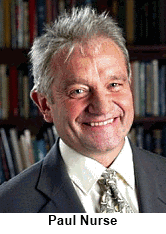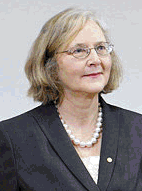|
|
|
|
|
|
|
News & Views item - May 2010 |
![]() Royal Society's Incoming President and Winner Take All? (May 3, 2010)
Royal Society's Incoming President and Winner Take All? (May 3, 2010)
The Council of the Royal Society announced on April 23 that it has recommended to the Fellows that Paul Nurse succeed Martin Rees as the society's president in November.
 Professor
Nurse, apart from his scientific and administrative credentials is noted for
voicing his forthright opinions and he was true to form in an interview he gave
The Times next day and which got published April 27.
Professor
Nurse, apart from his scientific and administrative credentials is noted for
voicing his forthright opinions and he was true to form in an interview he gave
The Times next day and which got published April 27.
You need a combination of special systems that attract and support those who are excellent [in conjunction with] rigorous reviews so that when they cease to be excellent, as many often are, they don't just hang on to those resources.
When challenged the 2001 Nobel Laureate told Nature: "The words didn't come out quite right, I do think there's a need to think about how one supports the very best science, which might need to be dealt with a little bit differently from the rest," and according to Nature's Geoff Brumfiel campaigning for greater support for the very best scientists in Britain is squarely on Professor Nurse' agenda.
As a trustee of the Howard Hughes Medical Institute he was involved in the institute's program which gives generous long-term support to researchers it considerers outstanding and who are judged will continue to do outstanding work. The money is granted to the individual and not for specific projects. The past November Britain's Welcome Trust undertook a similar initiative.
According to Mr Brumfiel: "Nurse says he would like to see something like this applied to government funding. He suggests that 100–150 leading researchers across all disciplines would receive enough money to fully fund their research, allowing them to hire staff and buy equipment. Their grants would be regularly reviewed to ensure that they were still producing work worthy of the support. Such a programme would cost only around £100 million to £200 million per year, he says, amounting to a few per cent of the UK government's science budget."
Of course the worry is just who would get what and how would it be decided. The recent move in Japan to increase the ratio of funding through competitive grants indicates the sort of pitfalls that need to be avoided.
As of 2009 only 13.8% of research funding was allocated through competitive grants, much of the rest being distributed through basic operating budgets award to university administrations. In an effort to increase value of research for money spent Nature reports that this year Japan's government has awarded "some of the biggest competitive grants Japanese researchers have ever seen. The 30 winning scientists will now have four years to spend an average of ¥3.3 billion (A$38 million) each, and will enjoy much greater autonomy under this 'researcher-focused' plan than that offered by previous grant programmes".
What exercises Nature's editorial writer is that "the programme could have been better planned. Consider, for example, that most of the 30... winners are already world-leading innovators — they include a Nobel laureate and some of the top-cited scientists in their fields. The majority of them were already the recipients of significant grants... it would have been encouraging to see some new faces. Because Japan's strategy for world-class innovation rewards researchers solely on the basis of their past success, it runs the risk of missing some excellent ideas from younger, less-established researchers... A proportion of the FIRST [Funding Program for World-Leading Innovative R&D on Science and Technology] money might arguably have been better spent on increasing the pot of money available through the already-existing mechanism for doling out small competitive grants."

While the problem of encouraging emerging talent maybe more acute in Japan than in Britain or Australia, it is still a matter of concern and it remains to be seen if once Professor Nurse assumes the RS presidency he will speak to it. And this brings to mind the matter of the the change in "command" at the Australian Academy of Science. Kurt Lambeck finishes his term as president later this year. Will his successor be as forthright as Paul Nurse or indeed Australia's most recent Nobel Laureate who on a recent visit observed:
"I think there are tremendously good scientists in Australia but sometimes I just feel, are they really being able to run with it in the way they are capable of?" Professor Blackburn asked rhetorically of Mr Trounson, and went on to say that in the US, she benefited from a five-year grant that allowed her to follow her nose without having to write up "damn little" reports and catalogue milestones on a regular basis. "This was the perfect setting and I'm not aware that I would have been able to do that [here]." And to make sure she was getting her message across: "Short dribs and drabs" of money with tight constraints on basic research are in her opinion wasteful.
We live in hope.